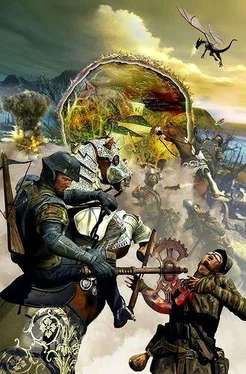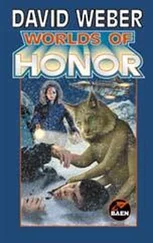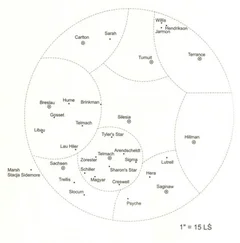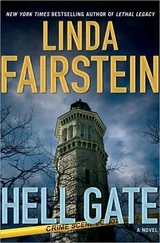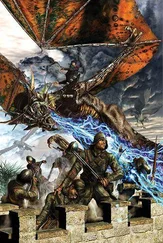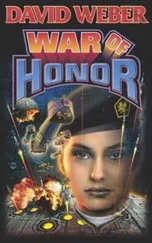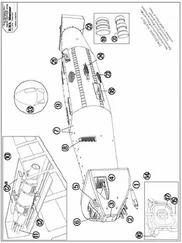She stopped again, gazing at Shaylar, and the Voice nodded slowly. Gadrial was right, she reflected. Assuming that the magister had described the Mythalans and Ransaran viewpoints as accurately?or, at least, honestly?as Shaylar was confident she had, it was scarcely surprising that the Mythalans would hate, despise, and fear everything Ransar stood for. And she could think of nothing someone with Gadrial's religious and philosophical values would find more revolting and cruel than the Mythalan caste system. Which only made the deep and obvious love which had existed between Gadrial and Magister Halathyn even more remarkable.
"At any rate," Gadrial continued, "given the Ransaran views on the preciousness of each individual life, the possibility of any of our major religions?most of which were still quite cheerfully chopping up the adherents of their Ransaran coreligionists at the time?signing off on the notion of trial-and-error experiments on humans was … remote, shall we say. So both the Mythalans and the Ransarans, each for their own very different reasons, outlawed that sort of experimentation on humans from the very beginning."
"But not on other creatures," Shaylar said, and managed not to grimace when Gadrial shook her head.
The more Shaylar heard about the Mythalans, the more she preferred the Ransarans. Yet it was obvious to her that even the humanistic Ransarans were very, very different from her own people. Most Sharonians would have found it exceedingly difficult to "sign off on" that sort of experimentation upon any creatures, not just humans. There were exceptions, of course, as she was well aware, but the existence of those like her mother, whose Talent allowed communication with sentient non-human species, made them rare. Very few Sharonians would have been prepared to suggest that a cow, or a chicken, was intellectually or morally equivalent to a human being. But, by the same token, very few Sharonians would have been prepared to deny that the great apes and the cetaceans had attained a very high level of intelligence which, if not equal to that of human beings, certainly approached it very closely. In some ways, that same Talent kept them from over-anthropomorphizing the lesser animals, with whom no meaningful contact was possible. Still, by and large, they tended to regard themselves as the stewards of the worlds in which they lived, and the notion of creating experimental monsters would have been highly repugnant to them.
Not that she had any intention of discussing that with Gadrial just now. Especially since, so far, she'd managed to conceal the existence of that specific Talent, despite her mother's life work.
If they ever ask me exactly who Mother's an ambassador to, keeping that particular secret a secret is going to get sticky, she thought. So let's not go there just now, Shaylar.
"So, how does all of this relate to transport dragons and battle dragons?" she asked, instead.
"Well, it was Ransaran magistrons who built the first dragons," Gadrial said, as if she were discussing how to go about baking a cake, Shaylar thought.
"'Built' them out of what?" the Voice demanded.
"There's some dispute about that," Gadrial admitted. "According to at least one tradition, there were still some of the great lizards living in Ransar at the time." She shrugged. "I've always had problems with that particular explanation, myself, since the fossil record seems to indicate that all of the great lizards had died out?rather abruptly, in geological terms?long before dragons were ever developed. Still, there are undeniable similarities.
"At any rate," she continued, as if blithely oblivious to the way Shaylar's eyes were bugging out ever so slightly, "the original dragons were developed in Ransar strictly as beasts of burden. As a way to move cargo quickly from point to point, for the most part, although there are still some wingless dragons in Ransar, where they've been used for centuries instead of horses or unicorns as really heavy draft animals. For the most part, though, their military applications were limited strictly to improving transport. Until the Mythalans got into the act, that was."
"And why did I see that one coming?" Shaylar demanded rhetorically.
"Because you're so clever," Gadrial told her with a wry chuckle.
"I've always rather suspected that Mythalan resentment that we primitive Ransarans had produced something they hadn't played a part in what happened," the magister continued. "After all, to be brutally honest, most of us were pretty primitive compared to Mythal, at that particular point. Hansara was a Tosarian, and Tosaria had evolved a much higher level of civilization than most of the rest of us. My ancestors, for example, were still painting themselves blue and yellow and pickling their enemies's heads as door ornaments at the time. As far as Mythal was concerned, though, all Ransarans were still doing that, and yet the Tosarians had produced not just dragons but Hansara's basic work. Given shakira arrogance, I'm sure they felt an enormous temptation to prove they could do it better than we had. But they weren't interested in simply improving transportation capabilities; they were looking for direct military applications."
Gadrial's amusement of only moments before had vanished.
"Skyfang is a pure transport type. As Daris says, he probably goes clear back to the first egg. Which means he's bigger, stronger, and less maneuverable than a battle dragon, but that he has more endurance and basic lift capability. And, aside from his teeth and claws, he has no natural weapons."
"You mean battle dragons do have other weapons?" Shaylar's eyes widened.
Mother Marthea! she thought shakenly. Surely the things' fangs, claws, and horns are vicious enough! How could even Mythalans want to add still more weapons to their nightmare?
"They certainly do." Gadrial's voice was as grim as if she'd actually Heard Shaylar's thought … and shared it. "The weapons Jasak's men used against your people are called 'infantry-dragons' because they replicate the 'natural' weapons the Mythalans built into their real dragons, Shaylar. Some battle dragons breathe fire?or, rather, spit fireballs. Others throw lightning bolts. And still others, despite periodic efforts to ban the breeds in question entirely, project poisonous gases and vapors."
Shaylar gazed at her in horror, and the magister shrugged. She was obviously sympathetic to Shaylar's reaction, but there was something more than simple sympathy behind that shrug, and she returned Shaylar's gaze levelly.
"I can understand that you find the thought frightening and unnatural, Shaylar," she said. "And I don't disagree with you that building something like that into a living creature is a typically Mythalan sort of thing to do. In fact, I've always thought battle dragons are probably the most horrific battlefield weapons?short of the mass destruction spells which were banned when the Union was formed, at least?that Arcana's ever deployed. But I can't believe your people are that much different from ours when it comes to fighting wars. You've thrown the fact that Jasak's troopers' infantry-dragons burned your people to death into the face of every Army officer you've confronted, and I admit that that's a horrible way to die. But war is full of horrible ways to die, isn't it? Are you going to tell me your people never poured flaming oil onto someone trying to storm a castle wall? That they never blew someone's abdomen open with those artillery pieces of yours?those "mortars"?and left him to bleed slowly to death on the field of battle, screaming in pain? Never used fire as a naval weapon that gave men the choice between burning to death or drowning when their wooden ships went up in flame around them?"
Shaylar started to open her mouth in a quick response, then paused and closed it once more. Gadrial was right, she realized. When it came to the organized slaughter of combat, there were countless horrific ways to die. No one had a monopoly on ghastliness.
Читать дальше
